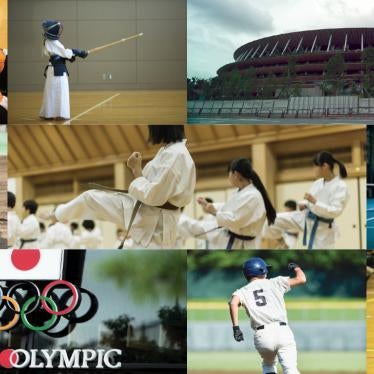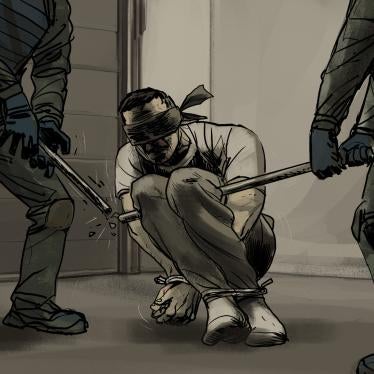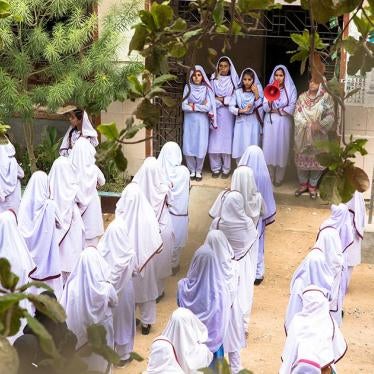June 3, 2013
Dato’ Sri Mohammed Najib bin Tun Abdul Razak
Office of the Prime Minister
Main Block, Perdana Putra Building
Federal Government Administrative Centre
62502 Putrajaya, MALAYSIA
Via facsimile: +60-3-8888-3444
Via E-mail: ppm@pmo.gov.my
RE: Arrests under the Peaceful Assembly Act
Dear Prime Minister Najib,
Human Rights Watch writes to express our serious concerns with your government’s actions following Malaysia’s 13th General Election, specifically the arrests and filing of charges against civil society activists and political opposition figures who alleged election malfeasance and disputed the election results.
We understand that the authorities have brought criminal charges against six people under section 9(1) of the Peaceful Assembly Act 2012 (PPA) for failing to provide the required 10-day advance notice to local police as organizers of the “Blackout 505” public assemblies. Those charged are: Nik Nazmi Nik Ahmad; Ong Eu Leong; Thomas Su; Mohammad Anuar Zakaria; Nazree Yunus; and R. Yuneswaran.
Criminal prosecutions of individuals for not meeting administrative requirements to engage in peaceful assembly violate fundamental human rights protections and should be dropped. The government should also commit to not bringing such cases in the future and working with parliament to revise the law.
To date, the Blackout 505 rallies have attracted large numbers of participants, but have been well ordered, peaceful, and non-disruptive. Normally they have been confined to clearly defined spaces or venues, such as sports stadiums and empty fields.
The rights to peaceful assembly and association are recognized by the Universal Declaration of Human Rights. The United Nations special rapporteur on freedom of assembly and of association, Maina Kiai, stated in his April 2013 report to the United Nations Human Rights Council that “peaceful protests should not be viewed as a threat” and that all states should “engage in an open, inclusive and meaningful dialogue when dealing with peaceful protests and their causes.” While peaceful assembly rights may be restricted when “prescribed by law” and for reasons that “are necessary in a democratic society in the interests of national security, public safety [or] public order,” the special rapporteur made clear that continued denial or restriction must meet strict conditions of necessity and proportionality and the presumption should be in favor of holding assemblies. With respect to permission and restriction, he said that 48 hours notification is the maximum that should be required, and even then only for large assemblies.
Malaysian government authorities also violated the rights to peaceful assembly and free expression when police broke up a peaceful candlelight vigil on May 22 in front of the Jingjang police station in Kuala Lumpur that was being held to call for the release of Adam Adli, a student leader arrested for and later charged with sedition. Police detained 18 people for participating in an unlawful assembly under article 143 of the Penal Code, and took statements from those being held without legal counsel being present. The police ultimately released all 18 on “police bail,” which requires them to return to the police if summoned.
Prominent officials in your government have also made public statements that call into question your government’s commitment to ensuring the right to peaceful assembly. For example, Home Affairs Minister Ahmad Zahid Hamidi told the media that people had to stop the post-election gatherings. He said that “if they still want to continue, then they will have to pay the price,” and suggested that a “silent majority” of Malaysians wanted the protests to stop. Zahid also stated in a pro-government newspaper that those who wished to adopt a different type of democracy “should migrate to these countries” that use a different democratic system—an unacceptable statement from a government official. Similarly, Kuala Lumpur police chief Mohmad Salleh told the media after the May 22 candlelight vigil that the police refused to “tolerate [the vigil], as it will only cause agitation among the public” and that “taking to the streets is not the solution.”
Malaysia’s inaction on the rights to peaceful assembly and free expression are not limited to within the country. In the two terms that Malaysia has been a member of the UN Human Rights Council, it has done little or nothing to protect or promote these rights internationally.
Malaysia should immediately take the following steps:
- Drop the charges against the organizers of the Blackout 505 rallies and other peaceful political events, and end the harassment and police investigations of other organizers on the grounds they failed to meet the 10-day notice requirement of the Peaceful Assembly Act (PAA);
- Make a public commitment that organizers and participants in future peaceful rallies will not be subject to criminal charges under the PAA;
- Drop charges of participating in an unlawful public assembly filed against 18 persons arrested at the May 22 vigil;
- Ratify the International Covenant on Civil and Political Rights (ICCPR);
- Amend the PAA and other provisions of the Penal Code addressing protests and assemblies to fully conform with the ICCPR.
I look forward to hearing from you at your earliest convenience to learn what steps your government has taken to address these concerns.
Sincerely yours,
Phil Robertson
Deputy Director, Asia Division
CC:
YB Dato 'Seri Dr. Ahmad Zahid bin Hamidi, Minister of Home Affairs
Tan Sri Khalid Abu Bakar, Inspector General of Police
Tan Sri Datuk Seri Panglima Abdul Gani bin Patail, Attorney General






